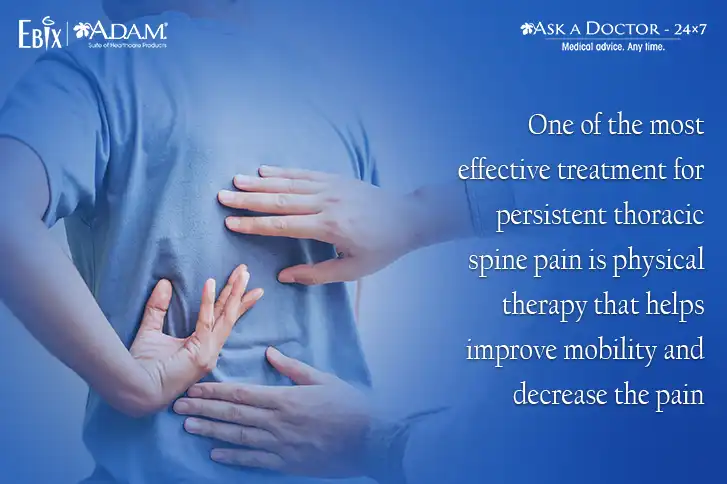5 Frequently Asked Questions About Thoracic Back Pain
It's Friday. You are at work, looking forward to the upcoming weekend and an exciting Friday evening out with friends. You reach home, get ready, and just when you are about to head out, an excruciating pain hits your mid-spine. The dreaded thoracic back pain is back, a completely wet blanket!
Triggered commonly due to causes such as poor posture, sitting on the computer for long hours, using a heavy backpack, sudden injury or trauma, shingles in older adults, and thoracic back pain can be quite bothersome.
Here are 5 most commonly asked questions about thoracic back pain:
1. What is thoracic back pain?

It is the pain that arises in the thoracic spine. It extends from the bottom of the neck to the start of the lumbar spine. Compared to lumbar and cervical spine pain, thoracic spine pain has not been researched extensively. Although most people get better without treatment, it can pose to be a hindrance to day-to-day functioning.
Tip: Simple home exercises such as cat-cow pose and cobra pose can help alleviate the pain by strengthening the back muscles.
2. What are the risk factors for thoracic spine pain?
Risk factors may include spinal trauma or injury, long sitting hours, repetitive motion, poor posture, and physical inactivity. Certain health conditions such as osteoporosis, osteoarthritis, ankylosing spondylitis, spinal tumors, and spinal stenosis also increase the risk.
Tip: If you have a desk job, try and get up at regular intervals to take a short walk.
3. Is thoracic spine pain common in children?

Yes, in children and teenagers thoracic spinal pain is quite prevalent. It is associated with postural changes due to backpack use, heavy backpacks, participation in certain sports, chair height in school, poorer mental health, and age transition from early to late adolescence.
Tip: If your child complains of back pain due to a heavy backpack, request the teacher for a locker at school to keep extra books.
4. What are the signs that I should look out for?
If you experience mid-back pain that refuses to go away, it can be a sign of thoracic back pain. Sudden, sharp pain such as someone is stabbing in the back, and stiffness in regular movements such as standing up, or getting in and out of bed can indicate thoracic back pain. Lookout for tingling or numbness, weakness, spasms, and burning sensation in areas such as the back, arms, chest, and lower extremities.
Tip: Applying heat therapy or an ice pack can reduce muscle aches and stiffness.
5. Are there any tests that I should go for?

Your healthcare provider may do a physical exam based on your history and severity of symptoms. In case the pain persists, an X-ray, CT scan, or MRI scan may be suggested. A blood test to check the blood count and inflammatory markers may also be ordered by your provider to rule out certain conditions.
Tip: If your pain is severe and lingering longer than usual, contact your provider on priority.
Stretching, home exercises, gentle massage and over-the-counter medicines such as ibuprofen can help relieve the symptoms of thoracic back pain. Try doing activities such as yoga, aerobics, walking, or any other low-impact activity. You can also apply a topical pain-relieving ointment. Don’t let back pain pull you back from enjoying the simple pleasures of life. It’s time to take charge and make your day-to-day life pain-free!
Ask an online doctor now, or book a consultation with a Spine Surgeon to get instant relief.
Recently Answered Question-Related to Thoracic Back Pain
Ask a Specialist
Recent Questions


